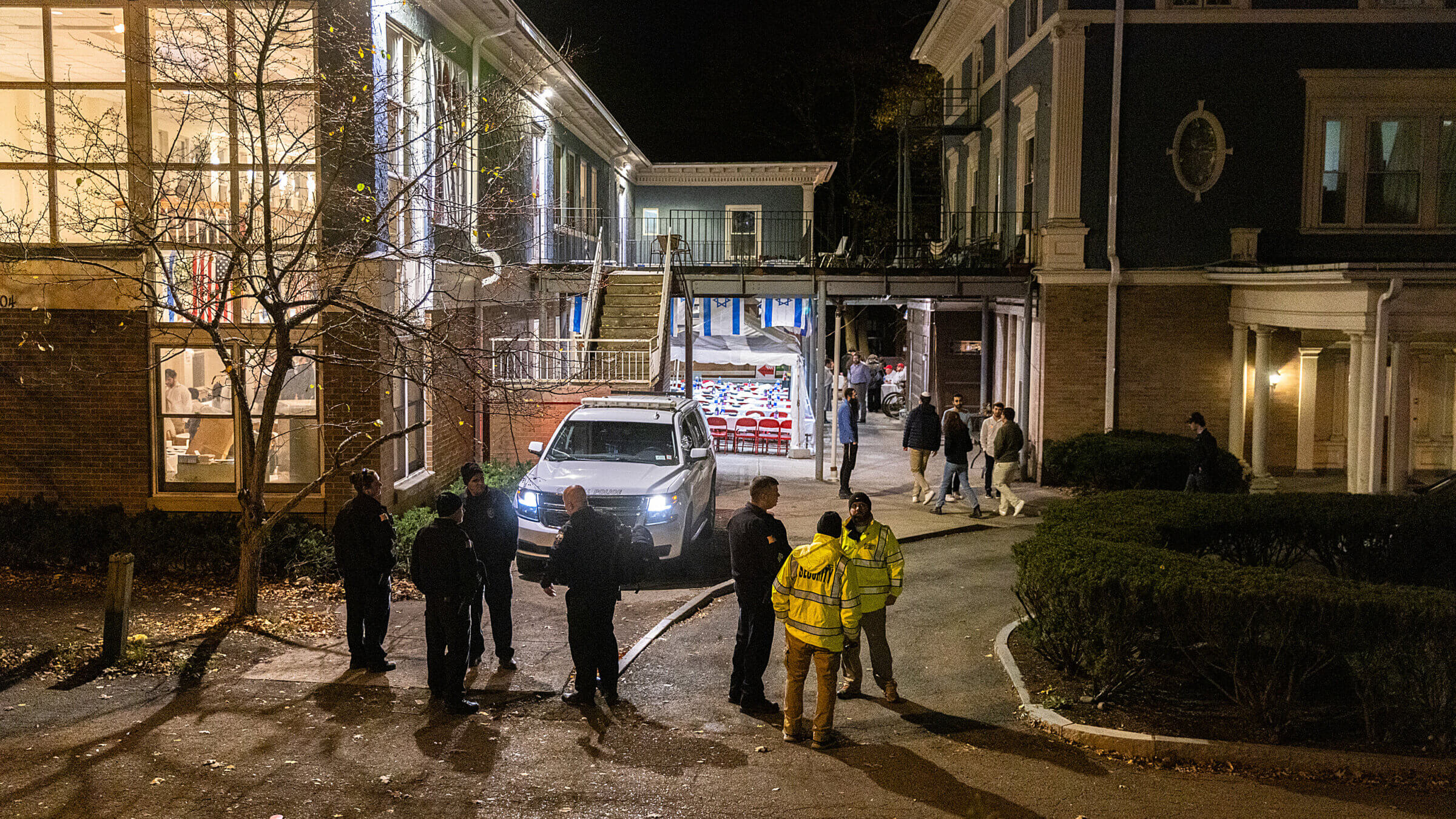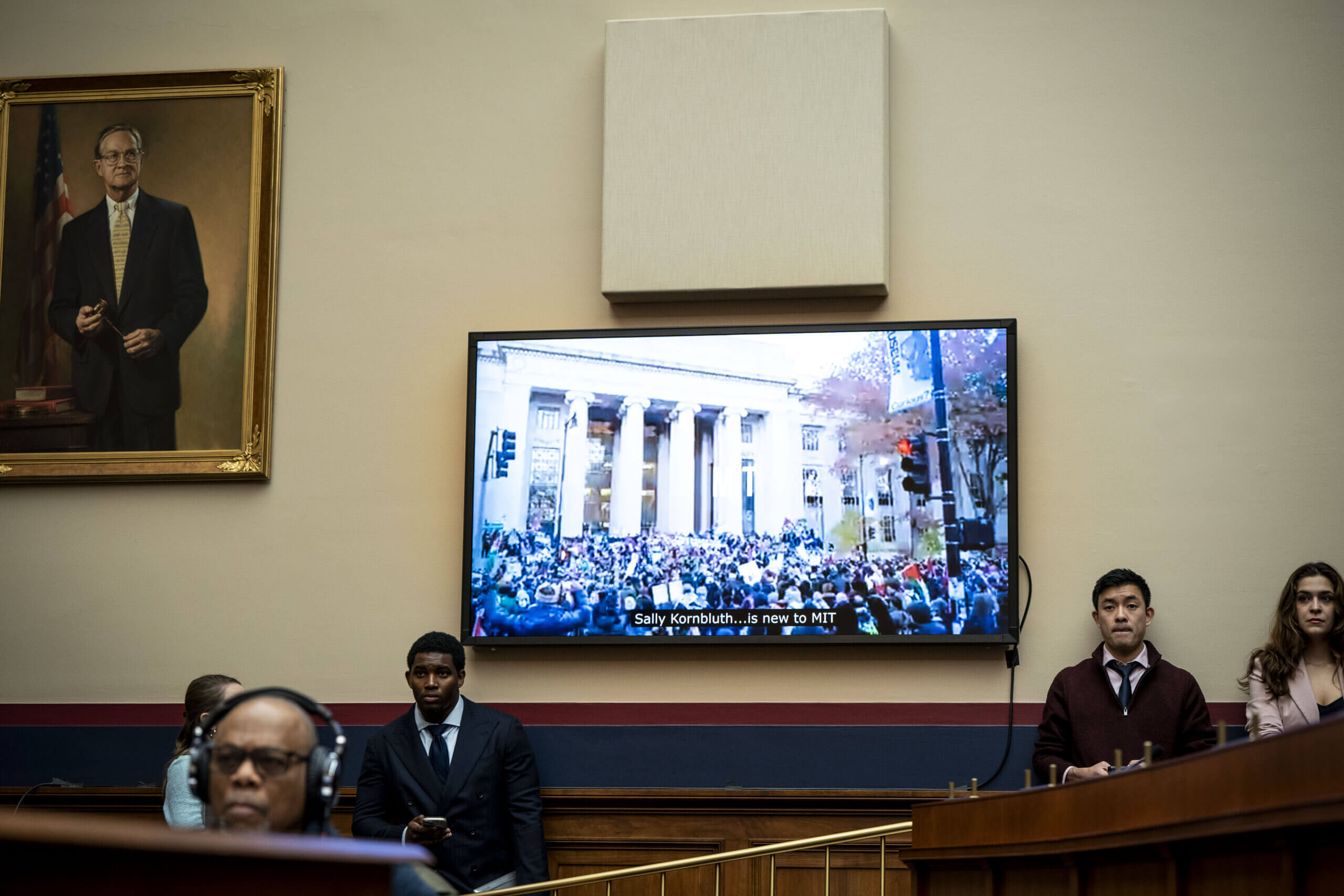Young Jews experience more antisemitism, but worry about it less
A new American Jewish Committee survey also found that the number of American Jews who report being targeted by antisemitism has remained flat, although more now believe it is a ‘very serious’ problem

Police and security stand outside the Center for Jewish Living at Cornell University in early November, after a student made violent antisemitic threats. Despite reporting experiencing higher rates of antisemitism, younger Jewish adults were less likely to say that it was a “very” serious problem. Photo by Getty Images
Though they experience more antisemitism than any other age group, younger American Jews are less likely to worry about discrimination, according to a new poll released Tuesday by the American Jewish Committee.
Thirty-six percent of Jews between the ages of 18 and 29 said they were the target of antisemitism at least once in the last year, compared to 22% of all Jewish adults. However, only 44% of younger Jews viewed antisemitism as a “very serious” problem, compared with 55% of American Jews in general.
Antisemitism on college campuses has been a hotly discussed topic in recent years. And since the Oct. 7 Hamas terrorist attack in Israel, and subsequent Israeli invasion of Gaza, furious protests against Israel have rocked universities and city streets, and antisemitic incidents and threats of violence have spiked.
But despite their exposure to more antisemitic incidents — 6% of those 18 to 29 told pollsters they had been physically assaulted, for example, compared to 3% of Jews overall — the youngest Jewish adults express less concern than their elders.
Holly Huffnagle, director of combating antisemitism for the AJC, speculated that younger Jews may be less likely to view antisemitism as a problem because they are more used to it.
“This might be what they know,” Huffnagle said. “They don’t know what it was like 20 years ago.”
Levels of concern over antisemitism track with views on Israel
The findings of the AJC poll, conducted over several weeks last fall, mostly after Oct. 7., matched those of a November survey by the Jewish Electorate Institute. That poll found that while nearly 80% of Jews 36 and older believed that antisemitism on college campuses was a “very serious problem,” that number dropped to 37% among Jewish voters aged 18 to 35.
Part of the discrepancy may relate to attitudes around Israel. Much of the concern over campus antisemitism has centered on pro-Palestinian activism that many leading Jewish organizations consider to be antisemitic, such as chants like “from the river to the sea, Palestine will be free.”

“I am very distressed by the demonstrations against Israel on college campuses and the lack of condemnation by the university administrators,” one 64-year-old Jewish man said in response to a survey question about campus antisemitism.
But younger Jews — including those who are college-aged — are both more likely to hold negative views toward Israel and, according to the AJC poll, less likely to view criticism of Israel as antisemitic. Nearly 90% of Jews over 30 believe that the statement “Israel has no right to exist” is antisemitic, compared to 67% of Jews under 30. The number of younger Jews who agreed it was bigoted has dropped more than 10 points since last year, when 78% said it was antisemitic.
The share of all American adults who believe that stating Israel does not have a right to exist is antisemitic remains high, at 84%, although that number has also fallen since last year when 90% agreed.
“We can imagine it’s because of the war and what they’re seeing,” Huffnagle said.
Concern over antisemitism is up, even as number of victims remains stable
Overall, American Jews expressed a significantly elevated level of concern over antisemitism last year — with 53% describing it as a “very” serious problem, up from 43% in 2022 and 38% in 2019 when the AJC began its annual antisemitism survey.
But for those same years, the number of Jews who reported being personally targeted with antisemitism during the 12 months has remained flat. Twenty-five percent said they had experienced antisemitism last year, compared to 26% two years ago and 24% in 2021.
“They’re hearing about it in the news and they’re hearing about it from others, whether or not they’ve experienced it themselves,” Huffnagle said. “But yes, would you think that more people would be experiencing it — and they’re not.”
Sixty percent of Jewish adults said they had encountered antisemitic content online last year, mostly on Facebook and X, formerly known as Twitter. About 30% of Jews said they had changed their behavior in the workplace to avoid antisemitism, including 24% who avoided expressing their opinions about Israel; 13% said they felt unsafe at work because they were Jewish, compared to 8% in 2022.
The survey also found that Jews are losing confidence in law enforcement’s ability to address the community’s security needs. Sixty-five percent believed that police were at least somewhat effective at keeping Jews safe, compared to 81% who agreed with that statement in 2019.
Only 17% of Jewish adults said they had heard at least something about the White House’s strategy to counter antisemitism, which was released last spring, although 57% at least somewhat approve of President Joe Biden’s response to antisemitism.
The survey was conducted by SSRS based on a sample of 1,528 Jewish adults polled online and by phone. It was launched on Oct. 5, but paused after the Oct. 7 attack and reintroduced later that month and ran through Nov. 21. The margin of error is plus or minus 3.2% percentage points for the overall survey, and slightly higher among smaller groups, including young Jews.






















